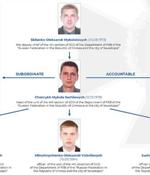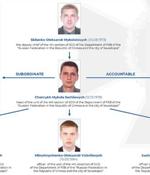Security News

The Russian FSB has identified the entire criminal enterprise known as "REvil". Police raids on 25 addresses in at least Moscow, St. Petersburg, Moscow, Leningrad and Lipetsk.

Ukraine's premier law enforcement and counterintelligence agency on Thursday disclosed the real identities of five individuals allegedly involved in digital intrusions attributed to a cyber-espionage group named Gamaredon, linking the members to Russia's Federal Security Service. Calling the hacker group "An FSB special project, which specifically targeted Ukraine," the Security Service of Ukraine said the perpetrators "Are officers of the 'Crimean' FSB and traitors who defected to the enemy during the occupation of the peninsula in 2014.".

Ukraine's premier law enforcement and counterintelligence agency on Thursday disclosed the real identities of five individuals allegedly involved in cyberattacks attributed to a cyber-espionage group named Gamaredon, linking the members to Russia's Federal Security Service. Calling the hacker group "An FSB special project, which specifically targeted Ukraine," the Security Service of Ukraine said the perpetrators "Are officers of the 'Crimean' FSB and traitors who defected to the enemy during the occupation of the peninsula in 2014.".

SSU and the Ukrainian secret service say they have identified five members of the Gamaredon hacking group, a Russian state-sponsored operation known for targeting Ukraine since 2014. This Gamaredon hacking group, tracked as Armageddon by the SSU, is allegedly operated under the FSB and is believed to be responsible for over 5,000 attacks in Ukraine since the operation began.

The reason I contacted the FSB - one of the successor agencies to the Russian KGB - ironically enough had to do with security concerns raised by an infamous Russian hacker about the FSB's own preferred method of being contacted. "Think well before contacting the FSB for any questions or dealing with them, and if you nevertheless decide to do this, it is better to use a virtual machine," Horohorin wrote.

If you thought the Mirai botnet was bad, what about a version under the control of Russia's military that it could point like an electronic cannon at people it didn't like? That's the prospect we could face after the reported emergence of secret Russian project documents online last week. The documents, which come from hacking group Digital Revolution but haven't been verified, suggest that Russia's Federal Security Service, has been working on an internet of things botnet of its own called Fronton.

A hacking group that distributed files stolen from a Russian contractor to the media last week has published some of the documents online.

A group of hackers has leaked online information on secret projects allegedly stolen from the servers of Russian Federal Security Service (FSB) contractor Sytech. read more

More nation-state activity in cyberspace, this time from Russia: Per the different reports in Russian media, the files indicate that SyTech had worked since 2009 on a multitude of projects since...

A summary of computer security news for you, delivered rapid-fire-style Roundup Let's catch up with all the recent infosec news beyond what we've already covered.…